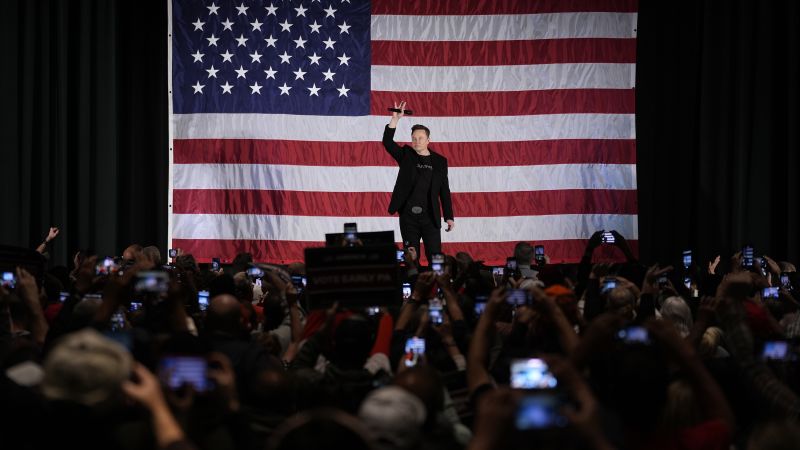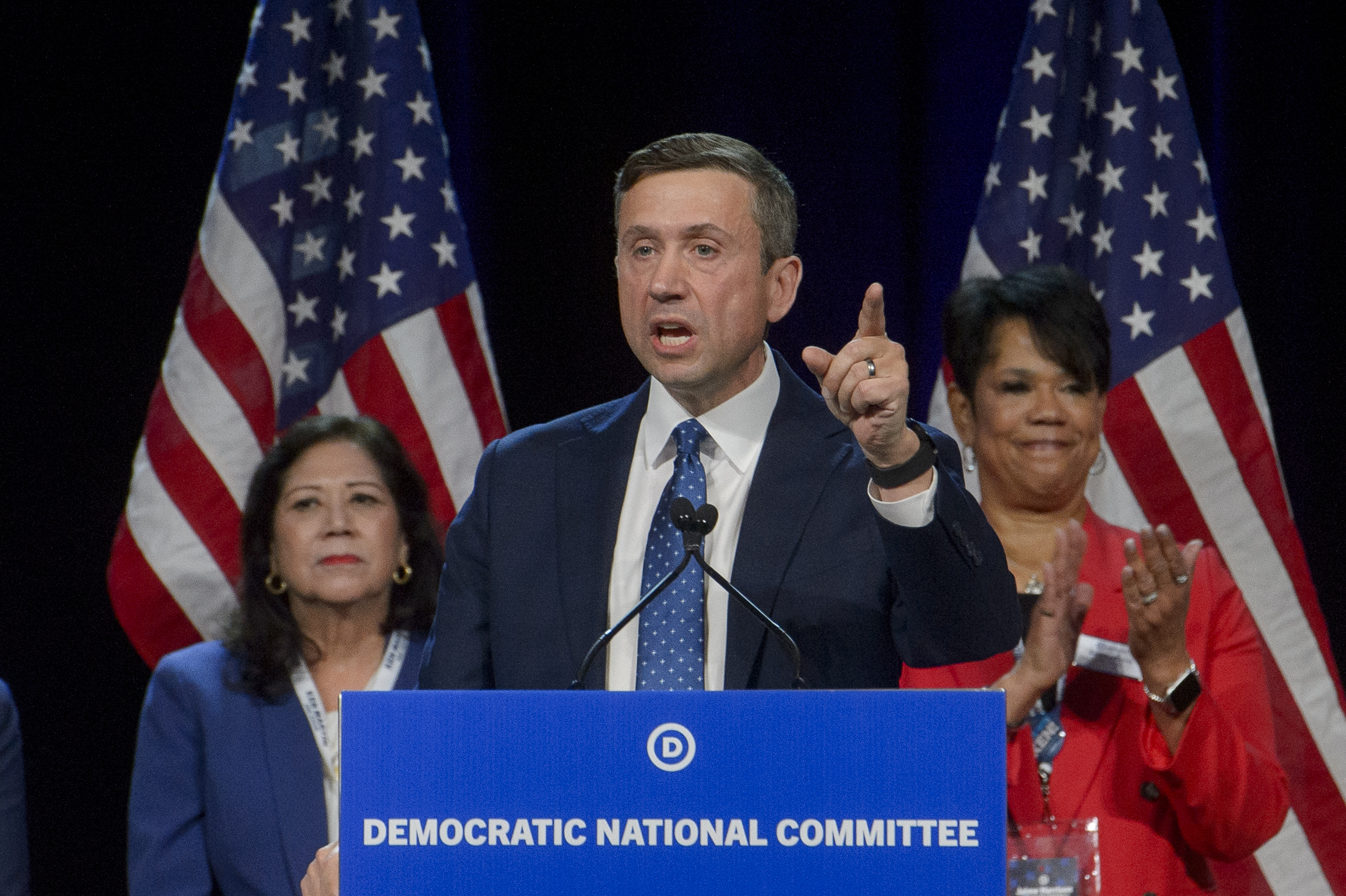Top Democratic elected officials and billionaire donors found out they don’t have much pull at the Democratic National Committee, where party insiders on Saturday chose a steady hand — Ken Martin — over their preferred choice for chair.
Neither Martin nor the pick of much of the establishment, Ben Wikler of Wisconsin, were promising a major overhaul of the party. And in selecting Martin, Democrats did little to answer some of the deepest questions their party faces as they search for a path out of the political wilderness.
Instead, inside a hotel ballroom at National Harbor in Maryland on Saturday, Democrats elected Martin, a longtime tactician and Minnesota state party leader who served as a vice chair of the Harris-Walz campaign. Notably, Martin said during his campaign for chair that the party already has “the right message.”
Democrats may be convinced they had it all along, despite the party’s defeat last year. One politician who appeared to have plenty of juice inside the DNC on Saturday was Kamala Harris.
Here are five takeaways from a contest that wasn’t defined by ideological differences or big-name candidates, but by old school politicking.
Billionaires — and big names — take a hit
The DNC has become a less prominent body since former President Barack Obama led the party. But members delivered a clear message to their party’s power-brokers in picking Martin as chair: They largely think billionaire donors and big-name elected officials are out of touch with the core of the base.
Suffering the biggest upset: Some Democratic billionaires who hoped to see Wikler take the top job. LinkedIn co-founder Reid Hoffman and George Soros’ Democracy PAC kicked in $250,000 each to the FORWARD PAC backing Wikler for chair — making up more than three-quarters of his campaign total, according to a Friday night filing with the Federal Election Commission.
Many of the party’s biggest players and rising stars had also backed Wikler. Among them: Senate Minority Leader Chuck Schumer, House Minority Leader Hakeem Jeffries, former House Speaker Nancy Pelosi and several high-profile governors, including Michigan’s Gretchen Whitmer and Kentucky’s Andy Beshear.
DNC voting members bucked them by picking Martin. Perhaps most notable is who didn’t endorse: Harris, the former vice president who steered clear of the fray.
Harris is still a force
Before the vote, Harris privately called the three front-runners and, in 15 to 20 minute conversations, told each that she looked forward to working “closely with the winning candidate as soon as they are elected.”
That was probably smart politics, sidestepping putting her thumb on the scale in a close race. But the real good news for Harris appeared to come in the wellspring of goodwill she seemed to enjoy on Saturday among the party faithful. During the meeting, Biden and Harris each delivered pre-recorded video messages to DNC members. And Harris’ appearance drew louder cheers than Biden’s.
Harris also joined a group of prominent Democrats in committing to raise money for the DNC in the coming weeks and months. If she runs again for president, it was a reminder that she is still regarded highly in many parts of the party.
Democrats want to make the DNC matter again
The DNC for years has been less of a visionary operation than a nuts-and-bolts one. But even before the vote, there were fresh signs that without the White House or Congress, some Democrats are hoping to make the DNC newly relevant to the party.
In recent days, an array of party elders and some of its brightest rising stars pledged to raise money on the DNC’s behalf, including everyone from Harris to former President Barack Obama, as well as potential 2028 candidates such as Minnesota Gov. Tim Walz, Michigan Gov. Gretchen Whitmer, Illinois Gov. JB Pritzker, Maryland Gov. Wes Moore and former Transportation Secretary Pete Buttigieg.
At a minimum, the party appears committed to rebuilding through the DNC as a major political vehicle in the coming months. And Martin, speaking to reporters after his election, offered a taste of what the message might be.
“This is a new DNC,” he said. “We’re taking the gloves off.”
Martin said, “I’ve always viewed my role as a chair of the Democratic Party to take the low road, so my candidates and elected officials can take the high road, meaning, I’m going to throw a punch.”
Diversity takes a back seat
For as much emphasis as Democrats place on diversity, Martin’s selection marks the first time since 2011 that the DNC will not be run by either a woman or a person of color. That’s when Tim Kaine resigned from the post to pursue a Senate run.
On Saturday, no woman or person of color was even among the front-runners for the role. Marianne Williamson, a self-help author and former presidential candidate, ended her campaign before voting began and threw her support to Martin. Faiz Shakir, a late entrant to the race who ran Sen. Bernie Sanders’ 2020 presidential campaign, garnered just two votes for chair. Quintessa Hathaway, who is Black, didn’t get a single vote.
It was a deflating outcome for some DNC members who lamented that the voices of women and people of color might fade in the party.
“Black women have always been the backbone of our party. We show up our communities, our party and our party in every election,” said Marilyn Davis, a longtime political operative and former DNC staffer, who lost in the race for party secretary to Jason Rae, who was elected for the third consecutive term, “Yet time and time again, we are overlooked when it comes to the top leadership positions in our party.”
In the chair’s race, Trish Ruiz, a delegate from New Mexico, said, “I really wish that we would have had a … bigger name female run.”
Next up: The primary calendar battle
Democrats were always planning to revisit their nominating calendar ahead of 2028. With a new chair in place, that fight starts now.
Martin has repeatedly pledged not to put his “thumb on the scale” when it comes to which states will vote first for the presidential nomination. In a forum earlier this week he vowed to hold a “fair and transparent” selection process that would produce a slate of states that would “battle-test” candidates and respect “the traditions and the diversity of our Democratic Party.”
But New Hampshire still has a state law that requires it hold its primary a week before any other. Not only are Granite State Democrats refusing to back down from that, but Republicans who run the state’s government are equally unwilling to change the law.
So Martin could be headed for the same stalemate his predecessor faced after Biden elevated South Carolina, which propelled him to the Democratic nomination in 2020, to the lead-off spot in 2024. That festered into a bitter intraparty feud that ended with New Hampshire defying the DNC and going first anyway, Biden winning on a write-in campaign, and the party ultimately declining to sanction the state’s delegates. With a much more open field expected in 2028, things could get even messier.
New Hampshire Democratic Party Chair Ray Buckley, an early and vocal supporter of Martin for chair, told POLITICO he trusts the DNC’s new leader to stay true to his word that each state will have a “fair shot” at primary calendar placement.
“We don’t need any special favors. But we don’t need somebody putting their thumb on the scale against us, either,” Buckley said. “We think we have a powerful message on why we should retain the first-in-the-nation primary.”














